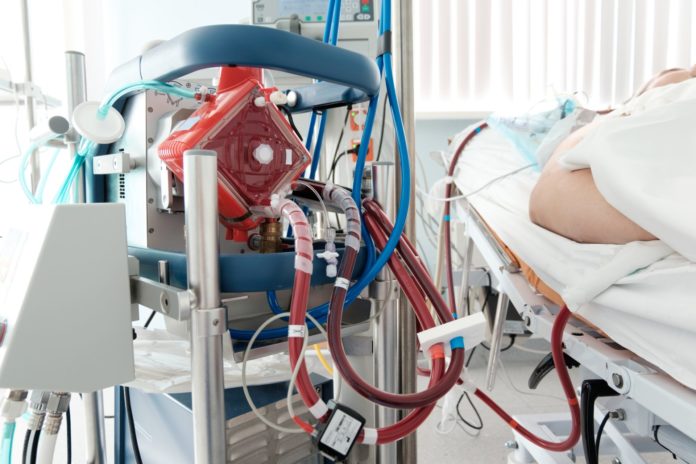Research to identify patients who will benefit most from a life-saving machine that acts as the heart and lungs following organ failure has received a $1 million Federal Government funding boost.
The Minister for Health and Aged Care, Mark Butler, announced the $999,779.40 Medical Research Future Fund (MRFF) Cardiovascular Health Mission grant during a visit to The Alfred’s Intensive Care Unit on National Heart Day.
The research involves the high-tech Extracorporeal Membrane Oxygenation (ECMO) machine, which simulates a heart/lung bypass after acute cardiac and respiratory failure, and cardiac arrest. It can replace a non-functioning heart or lungs for weeks.
ECMO is used in adults, children and newborns when all other forms of life support have failed. It has increased survival in these patients to around 60%. In the past five years, its use has doubled in Australia and globally.
The newly funded PRecision Ecmo in CardIogenic Shock Evaluation: PRECISE Study is led by Monash University’s Dr Aidan Burrell, in collaboration with Alfred Health, St Vincent’s Hospital Sydney, the University of Sydney, and The University of Queensland’s Critical Care Research Group.
PRECISE will recruit 236 patients to investigate whether biomarkers* can better identify patients who will derive the best long-term benefit from ECMO. The study is embedded in the National ECMO Registry (The EXCEL Registry) led by Professor Carol Hodgson, head of the Division of Clinical Trials and Cohort Studies, School of Public Health and Preventive Medicine, Monash University.
The EXCEL registry covers over 95% of ECMO patients nationally and includes over 1000 receiving ECMO. Over three years, the registry has embedded at least six clinical trials, including three randomised controlled trials to test early interventions aimed at improving patient outcomes.
Professor Hodgson said the PRECISE study aimed to improve patient outcomes by “bridging the gap between bench and bedside”.
“We have the unique opportunity to use this funding for the PRECISE study within a national ECMO registry to find the link between early biomarkers and long-term recovery in patients who have severe heart failure and need ECMO to survive,” Professor Hodgson said.
“This will help patients and families understand the recovery trajectory after critical illness and will help clinicians plan for the needs of their patients.”
Monash University Academic Vice-President and Dean, Faculty of Medicine, Nursing and Health Sciences, Professor Christina Mitchell, welcomed the grant and said the national ECMO registry team already had an outstanding research record and had shown that improved diagnosis, management and outcomes are achievable in Australia.
“This new funding will allow us to investigate whether biomarkers can better identify which patients will derive the best long-term benefit from ECMO, potentially leading to more targeted ECMO support and improved patient care,” Professor Mitchell said.
Dr Aidan Burrell led the MRFF grant as a NHMRC Investigator and an Intensive Care Specialist at Alfred Health. Associate Professor Vin Pellegrino, head of the Alfred ECMO service and investigator on the grant, leads the Victorian ECMO Service (Safer Care Victoria).


